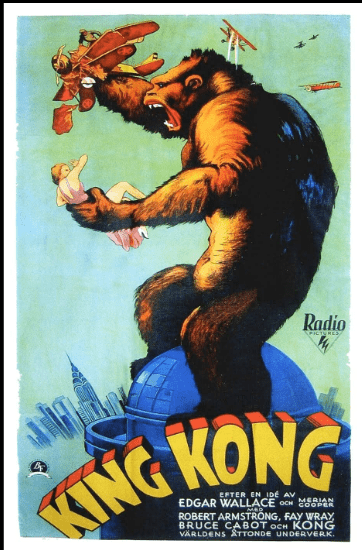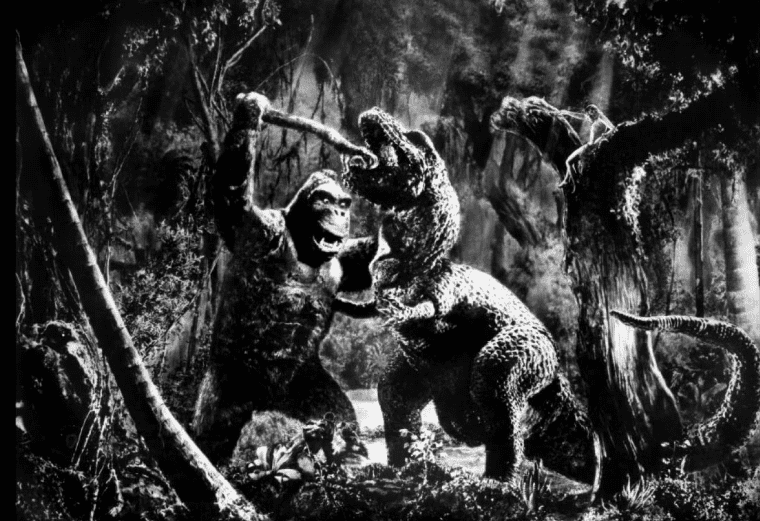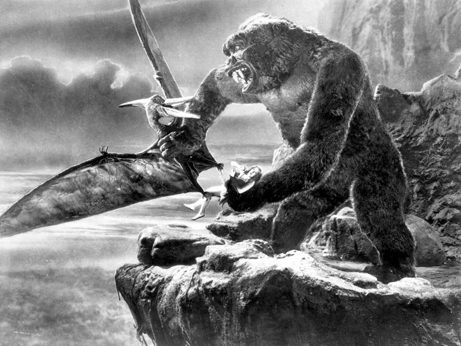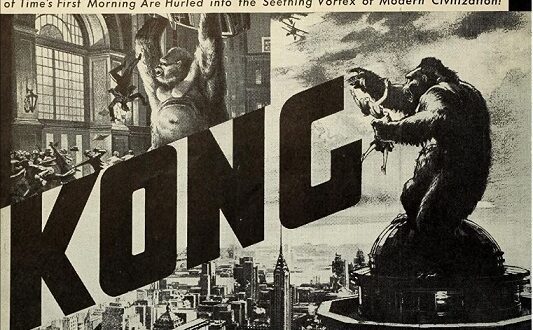Is King Kong the greatest monster movie of all time? Possibly. It is certainly among the most iconic, and like so many monster flicks to follow, it really involves people venturing to places they probably should not go. In this case, it’s a troubled voyage to Skull Island. The expedition finds and descends into the lair of the vicious Kong, the island’s most powerful inhabitant. Of course, King Kong ultimately ascends a skyscraper to swat at airplanes, after being crudely exploited for entertainment in front of a big city audience.
In addition to Kong facing humans, he challenges other large creatures in fights. Though they almost seem evenly matched, we soon learn why Kong is branded King. In fact, even when Kong is bound and prevented from attacking the crowd toward the end, he reveals his true might, due to his apparent connection with Ann Darrow (Fay Wray). Sure, Kong destroys a few things, and some humans perish by his hand, but is it really any worse than those humans who sacrifice each other by bomb, gun, or sword?
In addition to Fay Wray’s character, you have Robert Armstrong as Carl Denham and Bruce Cabot as John “Jack” Driscoll, as characters who really do bring some different elements to the story. Granted, few watch such a movie intending to focus on the human characters, but this is a movie where those scenes don’t tend to drag on. Of course, this is a straightforward reading of King Kong as just an action-oriented giant monster movie. What are other themes people commonly attribute to King Kong? Well, you surely read the title: Some people argue it’s racist.
The Kong-Sized Elephant in the Room: Is King Kong Racist? (It Depends On Who You Ask)
Yes, there is an elephant in the room that some feel complicates King Kong‘s greatness: Allegations of it having racist messaging. There, I said it, and some of you might read that and think, “Oh jeez! Another one of these articles?!” Well, yes, if we are going to talk about this classic old movie and its legacy, we perhaps should have such a discussion. After all, even if one doesn’t see King Kong as itself being particularly racist, it seems one must admit that such allegations aren’t entirely without cause.
Think about it: You have a tribe of “primitive” humans who attack the relatively “advanced,” intrepid, white explorers, and you have a beautiful white woman taken to the island’s king, the massive and vicious Kong, who the natives worship and offer Ann up as his unwilling bride. That sounds like trope central, doesn’t it?
Are There Counter-Arguments to King Kong‘s Alleged Racism?

If I’m being honest at all, I can see how some could construe that as having racist messaging not unlike other racist stereotypes (many of which were highly normalized at the time…though, perhaps ironically, I think the 2005 version of King Kong depicts its natives in a weirdly more cringe-worthy way). But how much does this critique withstand scrutiny, really? Are there any ways in which King Kong is decidedly non-racist, or could some elements be misunderstood or over-analyzed? Possibly.
It is true that directors Merian C. Cooper and Ernest B. Schoedsack themselves denied there was racist messaging, insisting that Kong simply represented “the primitive doomed by modern civilization” (Haver, Ron. Merian C. Cooper: The First King of Kong. American Film Magazine. New York: American Film Institute. p. 18.). It should also be noted that Cooper and Schoedsack were actually explorers and documentarians in real life, which explains at least part of their interest in such characters being depicted in King Kong. Also, as another possible bright side, King Kong avoided using “blackface,” opting to cast Noble Johnson as the Native Chief.
It’s also true that there exist hostile tribes in the real world, such as the Sentinelese, who are known for commonly attacking any outside visitors to their island (in fact, a film is being made about an Asian American Christian missionary who was killed after repeatedly entering their island). This doesn’t necessarily mean people have no right to be offended by this film’s depictions of natives, but simply that hostile islanders (like those depicted in King Kong) actually do exist in reality.
So Am I Saying “King Kong” is a Bad, Racist-Ass Movie?

Look, I know how some people are nowadays. They’ll read what I wrote above and think “He’s just a ‘woke’ leftist trying to impose race into everything! He’s the racist and he must hate King Kong!” Well, if that’s what you think, you can ease up on that and maybe step outside of the echo chamber for a little bit. Personally, I can still watch a movie like King Kong and enjoy what it has to offer.
Similarly, I can even watch a movie like Reefer Madness and potentially find some value in it, despite that movie having overtly, hysterically over-the-top paranoid messaging about pot smokers throughout (in fact, marijuana is so often called that nowadays because that was the Mexican word for the drug, which ties into racist tropes used in such propaganda campaigns against the drug). Fortunately, King Kong is better than Reefer Madness, and one probably isn’t a racist monster for enjoying it, just as one can watch Reefer Madness while stoned (and believe me, some people do, with the resulting irony being as thick as the plumes of pot smoke).
Really, what I am saying is that, like countless movies in existence, King Kong does have a complex/mixed legacy. I can attest to the fact that it brought joy to plenty of people’s lives, controversies aside, and it pays to take the good with the bad. There really is plenty of good to be found in some of the messaging in King Kong, such as how, from a certain perspective, it might call into question the value of exploring other lands and exploiting its “natural wonders.”
Obviously, these characters put themselves and others in danger all in a quest for glory. So one needn’t feel ashamed to watch King Kong or add that many layers to it. Still, that option will always be there for those who watch films with some hyper-critical lens, and those people also have a right to watch old-timey movies, which function like time capsules of what some people thought and felt at the time.

King Kong (1933) was released 90 years ago, this March 2. What are your thoughts on this monster movie classic? Tell us in the comments!
 PopHorror Let's Get Scared
PopHorror Let's Get Scared




